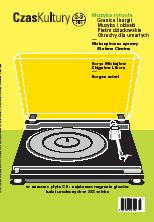Jesteśmy nieokrzesani...
Leszek Kolankiewicz: "We are crude…"
Author(s): Aleksandra Malcher, Leszek KolankiewiczSubject(s): Fine Arts / Performing Arts
Published by: Stowarzyszenie Czasu Kultury
Keywords: The crudeness of Europeans in comparison to the customs of the Japanese; The Japanese ritual in the temple and in the nō theatre; sphere of the sacrum in Polish theatre; Music and dance as tools of religious experience;
Summary/Abstract: Małgorzata Mikołajczak and Aleksandra Malcher talk to Leszek Kolankiewicz. Leszek Kolankiewicz, the first university teacher to introduce theatre anthropology in Poland. The enormous range of colourful theatrical spectacles which are to be observed in every corner of the world have for a long time fascinated anthropologists. Professor Leszek Kolankiewicz of Warsaw University was the first Polish academic to introduce seminars on theatre anthropology (1982). After his recent visit to Japan Professor Kolankiewicz concludes that Europeans are crude in comparison to the Japanese whose local customs are full of social politeness which can only be dreamt of in Europe. For example, the frequent bowing creates an exceptional climate of deep and mutual respect although at the same time limiting spontaneity. According to Professor Kolankiewicz, Japanese politeness seems to ideally harmonise with places of religious worship such as those in Kamakura. Unassuming wooden temples surrounded by plants and blissful silence are tended to with remarkable reverence. The same refers to the nō theatre which enchants with its mystery: before appearing on stage the main actor, the shite, “contemplates his mask for almost an hour to enable the spirit of his character to penetrate him.” Although by chance the Professor encountered an unexpected change of roles during the performance, this did not in any way interfere with the completion of the ritual of the nō theatre. Aspects of theatre which are studied by anthropologists express the sphere of the sacrum, although in modern European culture this sphere is perceived as a very narrow one contrary to the profane character of everyday life with its broad and overwhelming scope. The work of Białoszewski, Kantor and Grotowski make viewers aware, however, that magic can be observed in the “very centre of the profane”. The sacred can also be captured in music which is so often combined with dramatic art.
Journal: Czas Kultury
- Issue Year: 2004
- Issue No: 02-03
- Page Range: 12-18
- Page Count: 7
- Language: Polish
- Content File-PDF

